MARINE BARRACKS, WASHINGTON ― Four Marine infantry squads in their finest dress uniforms sit, eyes locked ahead, tracking the pacing of the most senior Marines in their Corps.
“The infantry is the center of the Marine Corps, has been in the past, will be in the future,” Commandant Gen. David Berger tells this collection of the finest squads he commands.
The more than 40 Marines and field corpsman sitting on those bleachers, a stone’s throw from the top Marine’s home, represented their respective battalion this past year in a revived Super Squad competition.
Sometimes with only one week’s notice, they patrolled, shot, marched, called for fire and navigated their way through a multiday torture test of infantry skills.
And then they had to do it again against the best squads in each division.
The winners of each of the Corps’ four divisions were flown here, toured the Marine Corps Museum, the Pentagon, other national monuments and historic sites and were honored during the only all-enlisted Marine evening parade held each year on Friday at the historic home of the Corps’ top brass.
The man with four stars on his dress uniform reminds them that with this win they take on another responsibility.
“The infantry’s the center of the universe if you are a Marine and you are the role models,” Berger said. “Like it or not, you are now a role model.”
Sergeant Major of the Marine Corps Troy Black already told the junior Marines in the group that their job is to return to this place, having won the competition in the coming years, but next time as the squad leader.
“That sense of competitiveness, that really drives the rest of the institution to think, ‘well if that squad can do it, my squad can do it,’” Black told Marine Corps Times. “And that’s really what we’re trying to drive for.”
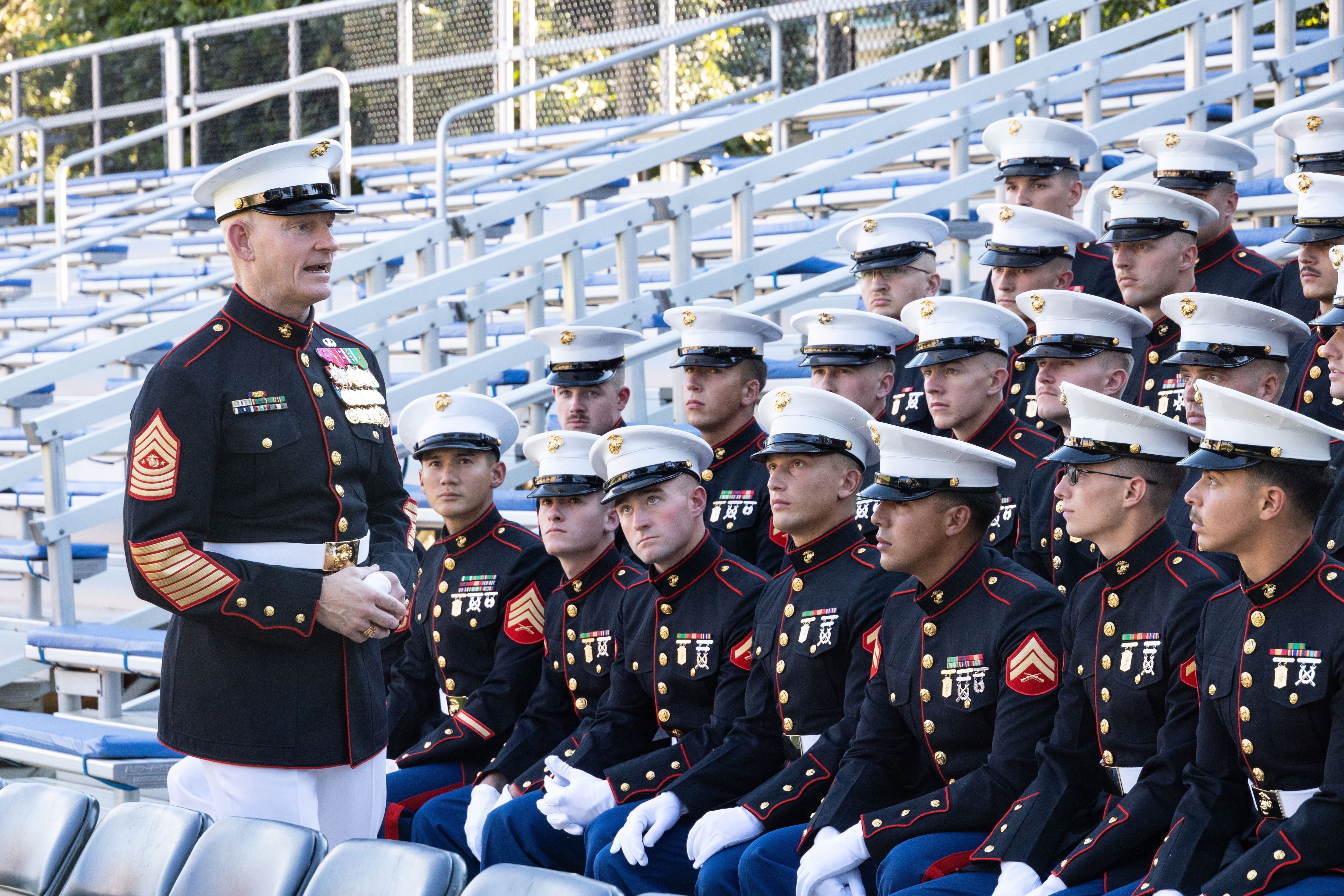
The competition ― revitalized in 2015 at the division level, but only in 2022 brought back to the home of the top Marine ― comes at a time of transformation for the Corps.
It involves more than five days of patrolling, land navigation, marksmanship, combat skills such as call for fire and air support.
Since Berger took over in 2019 his planning guidance and Force Design 2030 have altered major programs and units across the Corps. He has reduced the number of infantry battalions and battalion size.
The Corps divested itself of three infantry battalions in recent years, going from 24 to 21.
An infantry battalion traditionally has held about 900 Marines. Experiments brought that number down to 735 but, based on official accounts, the number likely will stabilize between 800 Marines and 835 Marines.
During this period the squad went from its historic configuration of 13 Marines up to 15 Marines, adding a squad systems operator and assistant team leader.
The Corps also overhauled infantry training as it pushes to keep squads together longer, train more and increase the rank at the leader level.
During the past decades of Middle East rotations, Marines at the rank of corporal or even lance corporal were leading reduced strength squads of 10 Marines on combat deployment.
The Corps plans to have sergeants as team leaders and staff sergeants leading squads as it matures the force.
The 2022 winning squads were:
• 1st Marine Division: 3rd Squad, 1st Platoon, Lima Company, 3rd Battalion, 4th Marine Regiment. Led by Sgt. Jose Torres.
• 2nd Marine Division: 1st Squad, 2nd Platoon, Echo Company, 2nd Battalion, 8th Marine Regiment. Led by Sgt. Jesse Courtain.
• 3rd Marine Division: 2nd Squad, 2nd Platoon, Alpha Company, 3rd Littoral Combat Team. Led by Sgt. Eric M. Ayers.
• 4th Marine Division: 1st Squad, 2nd Platoon, Fox Company, 2nd Battalion, 23rd Marine Regiment. Led by Sgt. Devin Gould.
A lifetime honor
Each Marine in those bleachers now sports a rare, coveted brass Super Squad badge with a relief image of an infantryman on the move, rifle in hand.
“Every time you walk into a new company office, people will look at that badg e …and they will assume you know what you are doing as an infantryman,” Black said. “Period. End of report.”
A slightly older Marine with many more chevrons and hashmarks on his sleeves than those in the bleachers stood in the wings.
He also had that rare, shiny infantry badge, though one with a bit more wear.
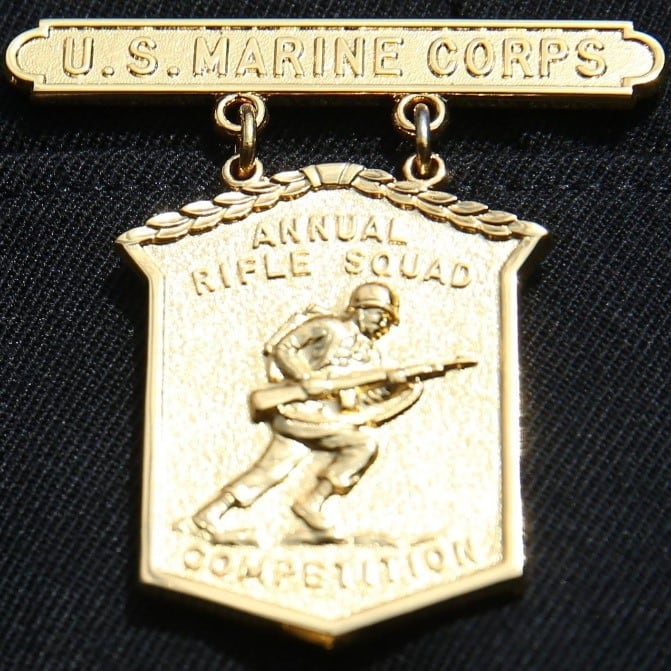
Sgt. Maj. Howard Kreamer was the junior Marine in his squad in 1992 when he served as 1st fire team rifleman in 1st Squad, 3rd Platoon, Charlie Company, 1st Battalion, 6th Marine Regiment.
He had just turned 19 years old and was engaged to be married ― Kreamer didn’t know what to expect.
He had been told in March 1992 that his squad would be competing. The next week he saw a “do you have what it takes” poster in the 6th Marines chow hall.
The next three months were jammed with training, both standard infantry field work and preparation for each level of the competition.
Now serving as the command senior enlisted leader for U.S. Strategic Command, Kreamer credits that competition as setting a course for his life in the Corps.
The experience cemented lifelong bonds with his squad leader and fire team leader. The extra knowledge helped him win “Marine of the quarter” and later meritorious promotions.
“This kind of started my career snowballing in the right direction,” he told Marine Corps Times.
The Corps had a kind of informal super squad competition among its larger units for decades, some officials believe dating back to at least 1957. It was a 1994 Marine Corps order made the D.C. trip and recognition an official act, though it had happened before.
Throughout the 1990s it was the premiere competition by which infantry units measured themselves and contained serious bragging rights for the parent battalion of each squad that won their division.
Then, 9/11 happened and the Corps got a little busy for a few years. Officials paused the competition due to demanding deployment schedules.
It was revived in 2015 but it was not until this past Friday that the winners were officially honored and recognized here at Marine Barracks-Washington.
On top of the individual badges that winning squad members wear, each division winning unit takes home the Mitchell Cup, named for Cpl. Robert Mitchell, who was awarded the Navy Cross for heroic actions while serving as a squad leader in Fallujah, Iraq.
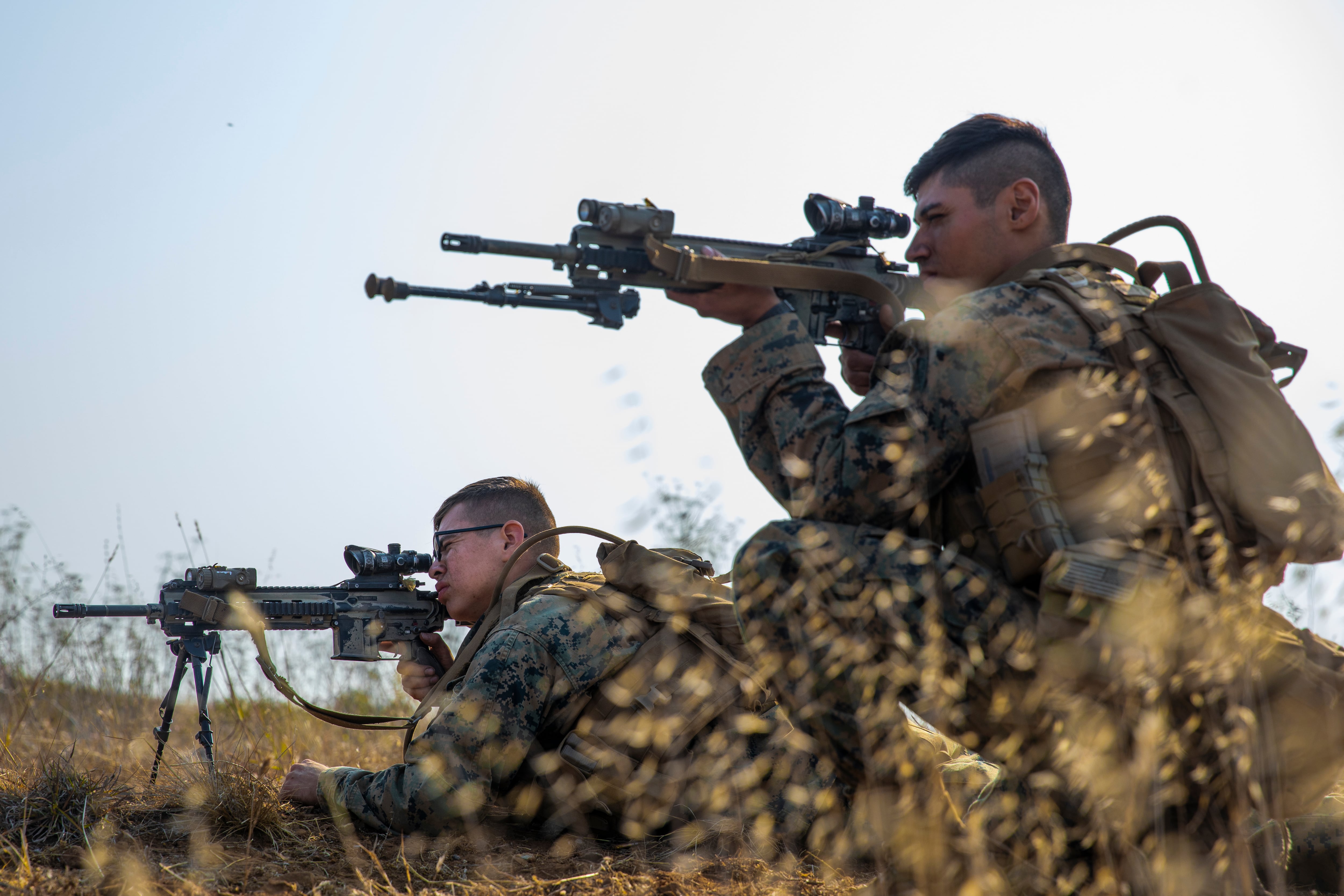
Leading a squad
Sgt. Jesse Courtain led 1st Squad, 2nd Platoon, Echo Company, 2nd Battalion, 8th Marine Regiment, to victory at the 2nd Marine Division competition.
The 24-year-old squad leader grew up in Norton, Kansas and joined the Corps a week after graduating high school in 2016.
He has been on deployments to Spain, Okinawa, Japan, and on a float with the 26th Marine Expeditionary Unit.
It was on deployment that his company commander told him about the competition, about two weeks before the first level began.
“I was very confident in my squad’s ability to accomplish everything we were going to have to do and get evaluated on in the competition,” Courtain said.
His competition took place at the Jungle Warfare Training Center in Okinawa, Japan.
The fundamental skills were second nature for him and most of his unit. The terrain, however, presented its own challenges.
The unit’s home base, Camp Lejeune, North Carolina, is swampy, but it doesn’t match the humidity or undulating terrain that the jungle center contains, he said.
Courtain didn’t mince words. He told his squad that they were going to be hot, tired and aggravated throughout the five-and-a-half-day course.
“But I told them we’re going to take it one event at a time we’re going to shift our focus and fix on one thing at a time and we’re going to put 100% effort into that one thing,” he said. “And after that one thing is over, we’re going to reflect on it, recuperate, recover and then we’re going to push on to the next thing.”
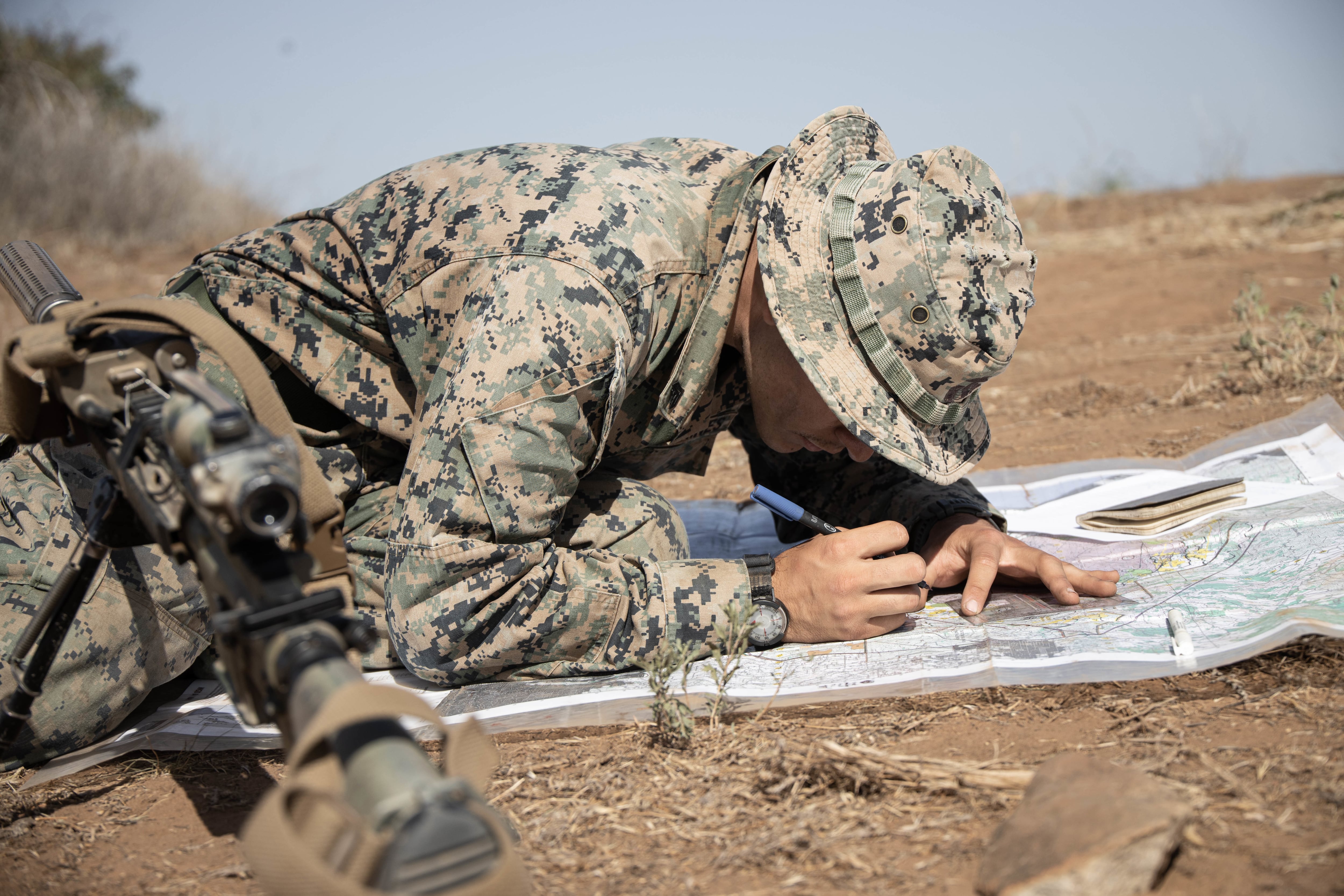
Sgt. Jose Torres grew up Barrigada, Guam, and left home for the Marines in 2015. He deployed twice with the 11th MEU, doing stints in parts of Africa, Kuwait and Jordan.
In the middle of company assault training on Range 400 at his home station, Marine Corps Air Ground Combat Center, Twentynine Palms, California, Torres got the proverbial tap on the shoulder that his squad was being tapped to compete.
They had about a week to prepare for the regimental level events. Most of that was simply sharpening his squad’s skills in the basics.
The unit had been together for a while, many of them since their time as brand-new grunts out of the School of Infantry.
Though the most senior, he was technically the newest guy in the squad, having joined up with 3rd Squad, 1st Platoon, Lima Company, 3rd BN, 4th Marines in December 2021.
“That’s one of the things the squad had, they knew each other, they trusted each other,” Torres said. “It was an easy transition for me to take control.”
Torres credits his senior team leaders and his deployment training, advanced infantry schools and two years as a marksmanship instructor on the range for his individual success in leading the squad during the competition.
And recent changes to initial infantry training are showing utility, he said some of the new Marines in the unit were knowledgeable on skills he hadn’t developed until he attended advanced training.
“These guys know a lot more than I did and a lot of other junior Marines,” he said.
Making it happen
Behind the scenes, some slightly more salty infantry Marines pulled together the elements it took to get this competition back to the forefront of ground combat element vision.
Two of those Marines are Chief Warrant Officer 5 Matt Anderson, the gunner at plans, policies and operations, and Master Gunnery Sgt. Andy Anderson, infantry occupation field sponsor.
The master gunnery sergeant had started his infantry career as a mortarman and competed in the super squad events in 1997, reaching the battalion level.
The gunner’s squad took second place at the division level in 1998 when he served with 1st Battalion, 5th Marines.
Both see value in the competition beyond the division and Corps-level recognition.
“I honestly believe it refocuses these squads and brings out the brilliance of the basics,” Master Gunnery Sgt. Anderson told Marine Corps Times.
The competitions give higher echelon unit commanders a “snapshot” of proficiency by pitting them against other Marine squads, Anderson said.
Though the Corps has changed the squad through Force Design 2030 and new tools now adorn the kit of grunts in 2022, the basics don’t really change.
“I don’t think we’re going get too far away from that last 100 yards that squad leader has to close with and destroy that enemy has proven time and time again that’s what the focus point is for the squad,” Anderson said.
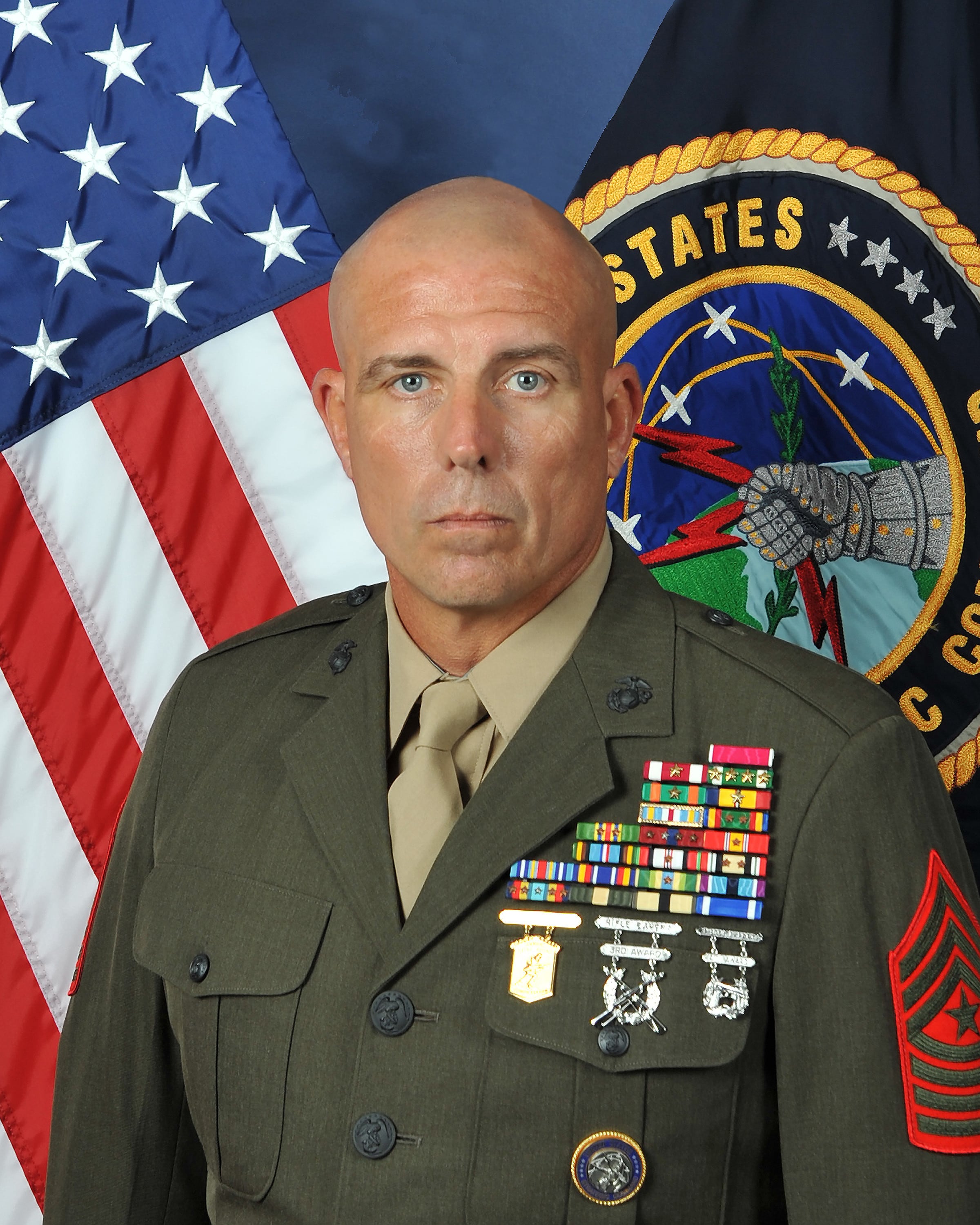
Back at the bleachers, Kreamer has two messages for these winning squads.
Reflecting on his younger self, looking back to three decades ago, Kreamer asks the age-old question: Was this competition as tough as the one he faced in 1992?
“It sounds like yours may have been a little bit more difficult than what we had to do,” Kreamer said. “If anybody tells you its easier, they’re freaking wrong.”
Lastly, the outgoing Marine gave an informed pitch he hopes will fall on attentive ears.
“You are talented, you have a talent for being an infantry Marine or greenside corpsman,” Kreamer said. “When you know you’re good at something, you might want to consider sticking with it.”
Todd South has written about crime, courts, government and the military for multiple publications since 2004 and was named a 2014 Pulitzer finalist for a co-written project on witness intimidation. Todd is a Marine veteran of the Iraq War.




